新人教版八上英语笔记Unit9
新人教版八年级英语上册复习短语笔记资料Unit 9 Can you come to my party中文
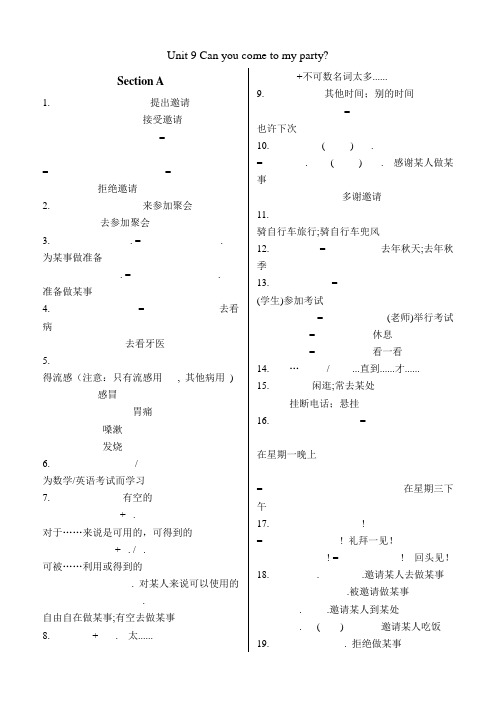
Unit 9 Can you come to my party?Section A1. ____ __ __________ 提出邀请______ __ __________ 接受邀请_______ __ __________ = ___ __ __ __ __________=______ __ __________ =____ ____ __ __________ 拒绝邀请2. ____ __ ___ _____ 来参加聚会__ __ _ _____去参加聚会3. _______ ___ ___. = ___ _____ ___ ___.为某事做准备_______ __ __ ___. = ___ _____ __ __ ___.准备做某事4. __ __ ___ ______ = __ __ ________ 去看病__ __ ___ _______ 去看牙医5. ____ ___ ___得流感(注意:只有流感用___, 其他病用_) ____ _ ____ 感冒____ _ ___________ 胃痛____ _ _____ 嗓漱____ _ _____ 发烧6. _____ ___ _ ____ / __ _______ ____为数学/英语考试而学习7. __ _________ 有空的__ _________ ___ + _.对于……来说是可用的,可得到的__ _________ __ + _. / _.可被……利用或得到的__ _________ __ __. 对某人来说可以使用的__ _________ __ __ ___.自由自在做某事;有空去做某事8. ____ ___ + ___. 太...... ___ ____ +不可数名词太多......9. _______ ____其他时间;别的时间_____ _______ ____ = _____ ____ ____也许下次10. ______ ___ (_____) ___.= _____ __. ___ (_____) ___. 感谢某人做某事______ ___ ______ 多谢邀请11. __ ____ ______骑自行车旅行;骑自行车兜风12. ____ ____ = ____ ______去年秋天;去年秋季13. ____ __ ____ = ____ __ ____(学生)参加考试____ __ ____ = ____ __ ____ (老师)举行考试____ _ ____ = ____ _ ____ 休息____ _ ____ = ____ _ ____ 看一看14. ___…_____ / ____...直到......才......15. ____ ___闲逛;常去某处____ __挂断电话;悬挂16. __ ______ _____ = __ ___ _____ __ ______在星期一晚上__ _________ _________= __ ___ _________ __ _________在星期三下午17. _____ ___ __ ______!=___ ___ __ ______! 礼拜一见!_____ ___ _____! = ___ ___ _____! 回头见!18. ______ __. __ __ ___.邀请某人去做某事__ _______ __ __ ___.被邀请做某事______ __. __ __.邀请某人到某处______ __. __ (____) ______ 邀请某人吃饭19. ______ __ __ ___. 拒绝做某事Section B20. ___ ___ _____ ________ 后天___ ___ ______ _________ 前天___ ____ ______ ____ ____ 前年____ ____ 去年____ ____ 今年____ ____ 明年___ ____ _____ ____ ____ 后年21. ____ _ _____ ______ 上钢琴课22. __ ________ = ____ ______ __ ______在工作日__ ________ 在周末____ _______这个周末____ _______上个周末____ _______下个周末23. ____ _____ = ____ ____ __ 照顾;照料____ _____ __. ____ = ____ ____ ____ __ __. 好好照顾;好好照料24. ____ __. ____ ___. = ____ __. (__) __ ___. 帮助某人做某事____ ___ ’ _ ____ = ____ ___ ____ __ __.在某人的帮助之下____ ___ (____ ___.)帮助摆脱困境/克服困难____ __. ___帮助某人解决问题或摆脱困境25. ___ __. __ ___.看到某人做了某事(强调看见某人做过某事)___ __. _____ ___.看到某人正在做某事(强调看见某人正在做某事)26. ____ _ ____ = __ __ / ___ _ ____ 去旅行____ _ ____ __ __. = __ __ __. ___ _ ____到某地去旅行27. __ ___ ___ __... 在......的末端;在......的尽头__ ___ ___ __ ____ _____ 在这个月月底__ ___ ___ __ ___ ____ 在路的尽头28. __ ____ / _____ __ __ ___.很高兴做某事29. __ +时间点到......为止__ ___到现在为止__ ____ ______到这个星期五之前为止30. __ _________ 感到惊讶__ _________ __ ___.对某事感到很惊讶__ _________ __ __ ___.惊讶地做某事31. _____ __想出;想起;认为_____ _____考虑;思考_____ ____好好考虑;深思熟虑32. _____ __. / ___. __ __. 带某人/某物到某地33. __ ____ 为了;以便34. ____ _______ __ _____ ___.期待做某事;盼望做某事35. ____ ____ __. = ___ / _______ _ ______ ____ __. 收到某人的来信____ _____ / __ ___. / __. 听说某事/某人36. ____ _ ____________ _____策划一个乔迁聚会____ _ _____ ___ __.为某人策划一个聚会____ _ ________ _____办一场惊喜聚会;开惊喜聚会__ ___ _____在聚会上37. ____ __成功;胜利(表示通过努力或经历困难后取得成功、完成某事)38. _____ __ _______以书面的形式进行回复_____ __ _____ _______回复这些来信_____ __ ___ ________=____ _ _____ __ ___ ________=______ ___ ________ 回答问题39. __ __ _ _______去听音乐会____ _ _______开音乐会40. __ __ ___ ______ = __ __ ___ _ ____=__ __ ___ ______ 去看电影。
八年级上人教版unit9知识点
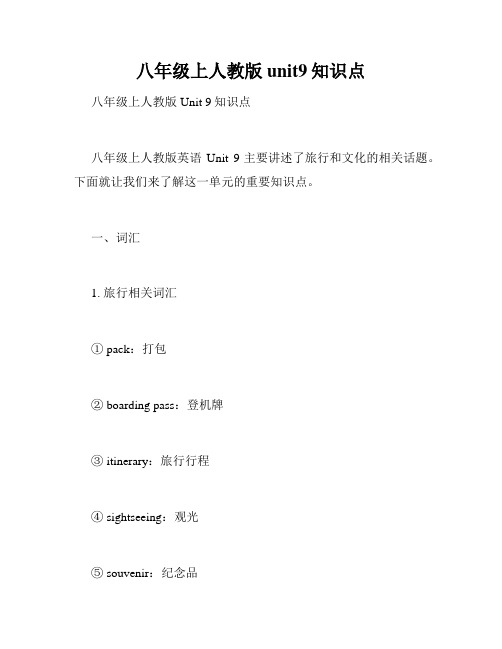
八年级上人教版unit9知识点八年级上人教版Unit 9知识点八年级上人教版英语Unit 9主要讲述了旅行和文化的相关话题。
下面就让我们来了解这一单元的重要知识点。
一、词汇1. 旅行相关词汇① pack:打包② boarding pass:登机牌③ itinerary:旅行行程④ sightseeing:观光⑤ souvenir:纪念品⑥ travel agency:旅行社⑦ tourist attraction:旅游胜地2. 语法1. 一般现在时旅行相关对话使用一般现在时,例如:① What do you usually pack when you travel?② What kind of souvenirs do you usually buy?2. 一般过去时旅行中出现的时间过去时使用一般过去时,包括:① went,took,saw,bought,visited等② What did you do last weekend?3. 现在进行时旅行计划中的动作通常使用现在进行时,例如:① I am packing my bags for the trip.② She is planning to visit Beijing next week.4. 现在完成时表示已经去过或者做过某事情,使用现在完成时,例如:① I have been to the Great Wall.② Have you ever tried the local food when you travel?5. 选择疑问句提出选择性质问题时使用选择疑问句,例如:① Do you prefer traveling alone or with a group?② Would you rather visit a big city or a small town?二、常用句型1. 问路句型Excuse me, how can I get to…?Can you tell me the way to…?Is it far from here to…?2. 寻找帮助句型Excuse me, could you help me?I wonder if you could tell me…Do you know where I can find…?3. 对话句型① What are you going to do this weekend?I am going to…/I am planning to…② Did you go anywhere special on your last vacation? Yes, I went to…/No, I didn't go anywhere special.三、文化知识在旅行中,我们还需要了解一些文化知识,这对于我们更好地了解当地的风俗习惯,与当地人交流有很大帮助。
人教 英语 八上 9单元知识点笔记
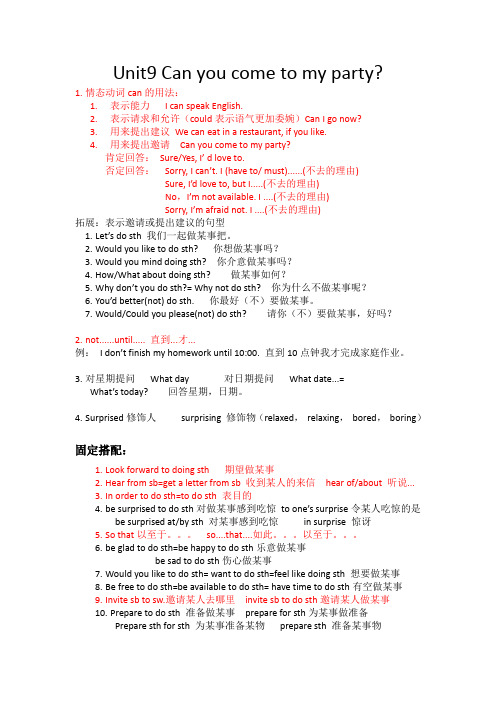
Unit9 Can you come to my party?1.情态动词can的用法:1.表示能力I can speak English.2.表示请求和允许(could表示语气更加委婉)Can I go now?3.用来提出建议We can eat in a restaurant, if you like.4.用来提出邀请Can you come to my party?肯定回答:Sure/Yes, I’ d love to.否定回答:Sorry, I can’t. I (have to/ must)......(不去的理由)Sure, I’d love to, but I.....(不去的理由)No,I’m not available. I ....(不去的理由)Sorry, I’m afraid not. I ....(不去的理由)拓展:表示邀请或提出建议的句型1.Let’s do sth 我们一起做某事把。
2.Would you like to do sth? 你想做某事吗?3.Would you mind doing sth? 你介意做某事吗?4.How/What about doing sth? 做某事如何?5.Why don’t you do sth?= Why not do sth? 你为什么不做某事呢?6.You’d better(not) do sth. 你最好(不)要做某事。
7.Would/Could you please(not) do sth? 请你(不)要做某事,好吗?2.not......until..... 直到...才...例:I don’t finish my homework until 10:00. 直到10点钟我才完成家庭作业。
3.对星期提问What day 对日期提问What date...=What’s today? 回答星期,日期。
4.Surprised修饰人surprising 修饰物(relaxed,relaxing,bored,boring)固定搭配:1.Look forward to doing sth 期望做某事2.Hear from sb=get a letter from sb 收到某人的来信hear of/about 听说...3.In order to do sth=to do sth 表目的4.be surprised to do sth对做某事感到吃惊to one’s surprise令某人吃惊的是be surprised at/by sth 对某事感到吃惊in surprise 惊讶5.So that以至于。
人教版初中英语八上unit9知识点
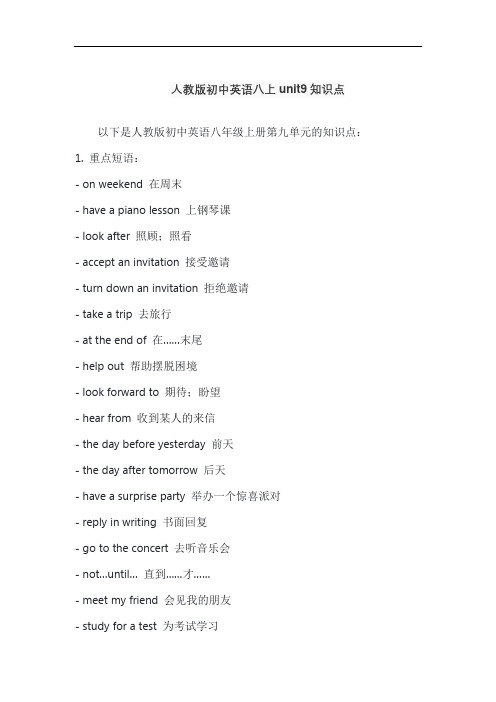
人教版初中英语八上unit9知识点以下是人教版初中英语八年级上册第九单元的知识点:1. 重点短语:- on weekend 在周末- have a piano lesson 上钢琴课- look after 照顾;照看- accept an invitation 接受邀请- turn down an invitation 拒绝邀请- take a trip 去旅行- at the end of 在……末尾- help out 帮助摆脱困境- look forward to 期待;盼望- hear from 收到某人的来信- the day before yesterday 前天- the day after tomorrow 后天- have a surprise party 举办一个惊喜派对- reply in writing 书面回复- go to the concert 去听音乐会- not…until… 直到……才……- meet my friend 会见我的朋友- study for a test 为考试学习2. 重点语法:- 用can 来表达邀请- Can you come to my party on Saturday?- Sure, I'd love to.- Sorry, I can't. I have to prepare for an exam.- 用must 来谈论职责和义务- I must finish my homework first.- I have to look after my sister.- 用might 来表示可能性- He might come to the party.- She might not be able to come.3. 重点句型:- Can you come to my party? 你能来参加我的聚会吗?- I'd love to, but I'm afraid I can't. 我很愿意,但恐怕不能。
新人教版八年级英语上册复习短语笔记资料Unit 9 Can you come to my party
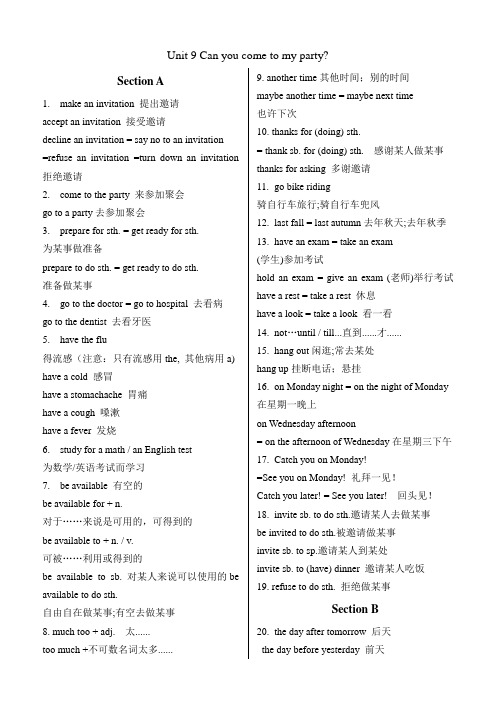
Unit 9 Can you come to my party?Section A1. make an invitation 提出邀请accept an invitation 接受邀请decline an invitation = say no to an invitation=refuse an invitation =turn down an invitation 拒绝邀请2. come to the party 来参加聚会go to a party去参加聚会3. prepare for sth. = get ready for sth.为某事做准备prepare to do sth. = get ready to do sth.准备做某事4. go to the doctor = go to hospital 去看病go to the dentist 去看牙医5. have the flu得流感(注意:只有流感用the, 其他病用a) have a cold 感冒have a stomachache 胃痛have a cough 嗓漱have a fever 发烧6. study for a math / an English test为数学/英语考试而学习7. be available 有空的be available for + n.对于……来说是可用的,可得到的be available to + n. / v.可被……利用或得到的be available to sb. 对某人来说可以使用的be available to do sth.自由自在做某事;有空去做某事8. much too + adj. 太......too much +不可数名词太多...... 9. another time其他时间;别的时间maybe another time = maybe next time也许下次10. thanks for (doing) sth.= thank sb. for (doing) sth. 感谢某人做某事thanks for asking 多谢邀请11. go bike riding骑自行车旅行;骑自行车兜风12. last fall = last autumn去年秋天;去年秋季13. have an exam = take an exam(学生)参加考试hold an exam = give an exam (老师)举行考试have a rest = take a rest 休息have a look = take a look 看一看14. not…until / till...直到......才......15. hang out闲逛;常去某处hang up挂断电话;悬挂16. on Monday night = on the night of Monday 在星期一晚上on Wednesday afternoon= on the afternoon of Wednesday在星期三下午17. Catch you on Monday!=See you on Monday! 礼拜一见!Catch you later! = See you later! 回头见!18. invite sb. to do sth.邀请某人去做某事be invited to do sth.被邀请做某事invite sb. to sp.邀请某人到某处invite sb. to (have) dinner 邀请某人吃饭19. refuse to do sth. 拒绝做某事Section B20. the day after tomorrow 后天the day before yesterday 前天the year before last year 前年last year 去年this year 今年next year 明年the year after next year 后年21. have a piano lesson 上钢琴课22. on weekdays = from Monday to Friday在工作日on weekends 在周末this weekend这个周末last weekend上个周末next weekend下个周末23. look after = take care of 照顾;照料look after sb. well = take good care of sb.好好照顾;好好照料24. help sb. with sth. = help sb. (to) do sth.帮助某人做某事with one ’ s help = with the help of sb.在某人的帮助之下help out (with sth.)帮助摆脱困境/克服困难help sb. out帮助某人解决问题或摆脱困境25. see sb. do sth.看到某人做了某事(强调看见某人做过某事)see sb. doing sth.看到某人正在做某事(强调看见某人正在做某事)26. take a trip = go on / for a trip 去旅行take a trip to sp. = go to sp. for a trip到某地去旅行27. at the end of... 在......的末端;在......的尽头at the end of this month 在这个月月底at the end of the road 在路的尽头28. be glad / happy to do sth.很高兴做某事29. by +时间点到......为止by now到现在为止by this Friday到这个星期五之前为止30. be surprised 感到惊讶be surprised at sth.对某事感到很惊讶be surprised to do sth.惊讶地做某事31. think of想出;想起;认为think about考虑;思考think over好好考虑;深思熟虑32. bring sb. / sth. to sp. 带某人/某物到某地33. so that 为了;以便34. look forward to doing sth.期待做某事;盼望做某事35. hear from sb. = get / receive a letter from sb. 收到某人的来信hear about / of sth. / sb. 听说某事/某人36. plan a housewarming party策划一个乔迁聚会plan a party for sb.为某人策划一个聚会have a surprise party办一场惊喜聚会;开惊喜聚会at the party在聚会上37. make it成功;胜利(表示通过努力或经历困难后取得成功、完成某事)38. reply in writing以书面的形式进行回复reply to these letters回复这些来信reply to the question=make a reply to the question=answer the question 回答问题39. go to a concert去听音乐会give a concert开音乐会40. go to the movies = go to see a film=go to the cinema 去看电影。
人教版八年级上册英语-Unit-9单元知识点总结
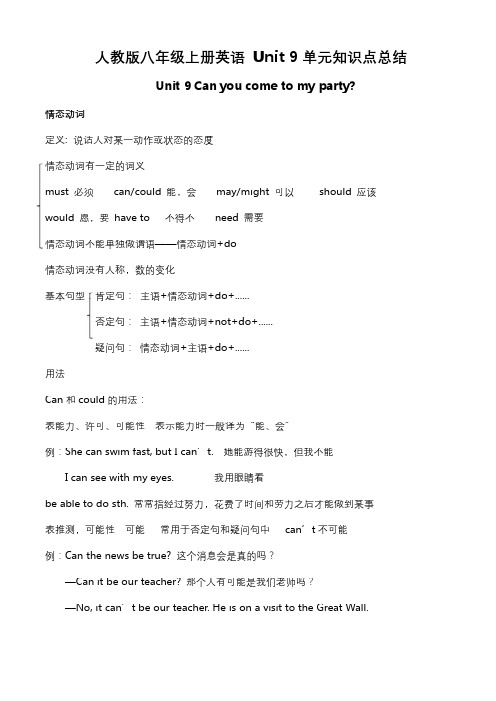
Unit 9 Can you come to my party? 情态动词定义: 说话人对某一动作或状态的态度情态动词有一定的词义must 必须can/could 能,会may/might 可以need 需要should 应该would 愿,要have to 不得不情态动词不能单独做谓语——情态动词+do情态动词没有人称,数的变化基本句型:肯定句:主语+情态动词+do+......否定句:主语+情态动词+not+do+......疑问句:情态动词+主语+do+......用法Can 和 could 的用法:表能力、许可、可能性表示能力时一般译为“能、会”例:She can swim fast, but I can’t.她能游得很快,但我不能I can see with my eyes. 我用眼睛看be able to do sth. 常常指经过努力,花费了时间和劳力之后才能做到某事表推测,可能性可能常用于否定句和疑问句中can’t不可能例:Can the news be true? 这个消息会是真的吗?—Can it be our teacher? 那个人有可能是我们老师吗?—No, it can’t be our teacher. He is on a visit to the Great Wall.could 在疑问句中,表示委婉的语气,此时could 没有过去式的意思例:—Could I use your pen? 我能用一下你的钢笔吗?—Yes, you can.可以(用 could 问,不能用 could 答。
)may 和 might 的用法表请求、许可,比 can 正式例:May I borrow your bike? 我可以借你的自行车吗?You may go home now. 现在你可以回家了表推测,谈论可能性可能,或许一般用于肯定句中may not 翻译为“可能不”例:It may rain tomorrow. 明天可能会下雨She may be at home. 她可能在家呢may 的过去式为 might ,表示推测时。
人教版英语八年级上第九单元知识点整理
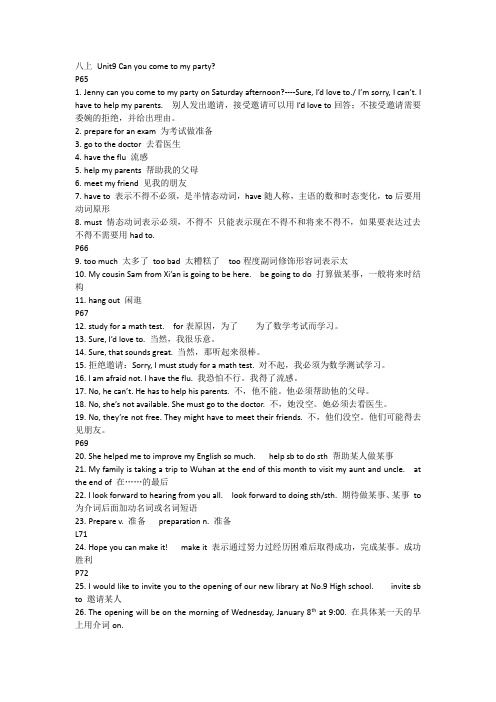
八上Unit9 Can you come to my party?P651.Jenny can you come to my party on Saturday afternoon?----Sure, I’d love to./ I’m sorry, I can’t. I have to help my parents. 别人发出邀请,接受邀请可以用I’d love to回答;不接受邀请需要委婉的拒绝,并给出理由。
2.prepare for an exam 为考试做准备3.go to the doctor 去看医生4.have the flu 流感5.help my parents 帮助我的父母6.meet my friend 见我的朋友7.have to 表示不得不必须,是半情态动词,have随人称,主语的数和时态变化,to后要用动词原形8.must 情态动词表示必须,不得不只能表示现在不得不和将来不得不,如果要表达过去不得不需要用had to.P669.too much 太多了too bad 太糟糕了too程度副词修饰形容词表示太10.My cousin Sam from Xi’an is going to be here. be going to do 打算做某事,一般将来时结构11.hang out 闲逛P6712.study for a math test. for表原因,为了为了数学考试而学习。
13.Sure, I’d love to. 当然,我很乐意。
14.Sure, that sounds great. 当然,那听起来很棒。
15.拒绝邀请:Sorry, I must study for a math test. 对不起,我必须为数学测试学习。
16.I am afraid not. I have the flu. 我恐怕不行。
我得了流感。
17.No, he can’t. He has to help his parents. 不,他不能。
人教版英语八年级上册unit9学生笔记

Unit 9 Can you come to my party?Section A课文翻译Section A 2dJeff:Hey,Nick,can you come to my house on Saturday?My cousin Sam from Xi'an is going to be here.Nick:Oh,Sam!I remember we went bike riding together last fall when he visited you.Jeff:Yes,that's right.Nick:I'd love to come,but I'm afraid I can't. I have an exam on Monday so I must prepare for it.Jeff:That's really too bad!①Oh,but Sam isn't leaving until next Wednesday.②Can you hang out with us on Monday night?Nick:Sure!③Catch you on Monday!杰夫:嘿,尼克,星期六你能来我家吗?我来自西安的表弟萨姆打算到这儿。
尼克:哦,萨姆!我记得去年秋天他来看你时,我们一起骑自行车旅行过。
杰夫:是的,很对。
尼克:我想去,但是恐怕不行。
星期一我有一次考试,所以我必须为此而准备。
杰夫:那真是太糟糕了!哦,但是萨姆直到下周三才要离开。
你可以在周一晚上和我们去闲逛吗?尼克:当然可以了!周一见你们!知识详解1.—Jenny,can you come to my party on Saturday afternoon?詹妮,星期六下午你能来参加我的聚会吗?—Sure,I'd love to.当然,我很愿意。
【解读】本句是一般疑问句。
人教版英语八年级上册Unit9单词+课文+知识梳理
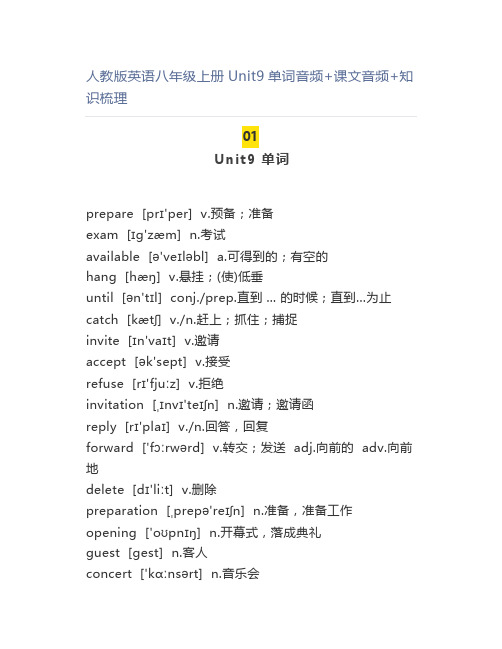
人教版英语八年级上册Unit9单词音频+课文音频+知识梳理01Unit9 单词prepare [prɪ'per] v.预备;准备exam [ɪɡ'zæm] n.考试available [ə'veɪləbl] a.可得到的;有空的hang [hæŋ] v.悬挂;(使)低垂until [ən'tɪl] conj./prep.直到 ... 的时候;直到…为止catch [kætʃ] v./n.赶上;抓住;捕捉invite [ɪn'vaɪt] v.邀请accept [ək'sept] v.接受refuse [rɪ'fjuːz] v.拒绝invitation [ˌɪnvɪ'teɪʃn] n.邀请;邀请函reply [rɪ'plaɪ] v./n.回答,回复forward ['fɔːrwərd] v.转交;发送 adj.向前的 adv.向前地delete [dɪ'liːt] v.删除preparation [ˌprepə'reɪʃn] n.准备,准备工作opening ['oʊpnɪŋ] n.开幕式,落成典礼guest [ɡest] n.客人concert ['kɑːnsərt] n.音乐会headmaster [ˌhed'mæstər] n.校长event [ɪ'vent] n.大事,公开活动calendar ['kælɪndər] n.日历,日程表02U n i t9课文03U n i t9知识梳理Unit9. Can you come to my party?【重点短语】1、on Saturday afternoon 在星期六下午2、have to 必须3、 prepare for 准备4、go to the doctor 去看病5、have the flu 患流感6、help my parents 给父母帮忙7、come to the party 参加晚会8、meet my friend 见朋友9、go to the party 参加晚会10、too much homework 太多的家庭作业11、go to the movies 去看电影12、another time 下次,另外的时间,别的时间13、last fall 去年秋天14、hang out 闲逛15、after school 放学后16、on the weekend=on weekends 在周末17、study for a test 备考18、visit grandparents 拜访爷爷奶奶19、the day before yesterday 前天20、the day after tomorrow 后天21、have a piano lesson 上钢琴课22、look after 照看23 make an invitation 制定邀请24、accept an invitation 接受邀请turn down (refuse) an invitation 拒绝邀请25、take a trip to Wuhan 去武汉旅游26、at the end of this month 在本月底27、look forward to + doing 期望/渴望28、the opening of… 开幕/开业29、reply in writing 写回信30、go shopping 购物31、do homework 做作业32、go to the concert 参加音乐会33、not…until… 直到......才......【重点句型】1. --Can you come to my party on Saturday afternoon?星期六下午你能参加我的晚会吗?--Sure, I’d love to. / Sorry,I can’t. I have to prepare for an exam.当然,我愿意去。
八年级上册人教版英语第九单元笔记
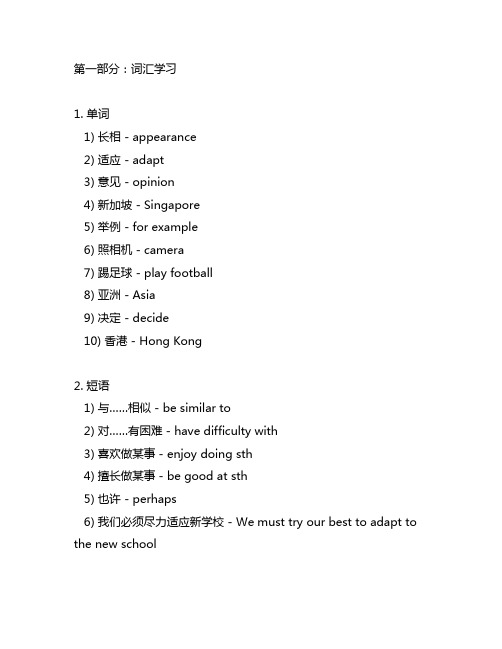
第一部分:词汇学习1. 单词1) 长相 - appearance2) 适应 - adapt3) 意见 - opinion4) 新加坡 - Singapore5) 举例 - for example6) 照相机 - camera7) 踢足球 - play football8) 亚洲 - Asia9) 决定 - decide10) 香港 - Hong Kong2. 短语1) 与……相似 - be similar to2) 对……有困难 - have difficulty with3) 喜欢做某事 - enjoy doing sth4) 擅长做某事 - be good at sth5) 也许 - perhaps6) 我们必须尽力适应新学校 - We must try our best to adapt to the new school3. 句型1) 戴安娜看起来有点不高兴 - Diana looks a bit unhappy2) 我认为你应该和新同学交朋友 - I think you should make friends with your new classmates3) 与我的朋友相似 - similar to my friend第二部分:语法学习1. 形容词比较级和最高级1) 基本用法a. 用于形容词、副词、动词和短语前面b. -er/-est 或 more/most2. 形容词比较级和最高级的用法1) 表示不同程度的比较 - He is taller than me2) 用于三者或三者以上的比较 - This is the tallest building in the city3) 用于句型中 - The more you practice, the better you will be3. 形容词比较级和最高级的形式1) 单音节形容词比较级和最高级的变化规则2) 双音节形容词比较级和最高级的变化规则3) 重读闭音节形容词比较级和最高级的变化规则第三部分:阅读理解与写作1. 阅读理解1) 阅读原文Diana looks a bit unhappy because she misses her friends in Singapore. She thinks it's difficult to make friends here. She doesn't want to play football because she is not good at it. She decides to take a camera to the new school.2) 阅读提问a. 为什么Diana看起来有点不高兴?b. 为什么Diana不想踢足球?c. Diana决定带着什么去新学校?2. 书面表达1) 以 "Adapting to a New School" 为题写一篇英语作文a. 介绍适应新学校的重要性b. 讨论适应新学校的方法c. 共享自己的个人经历本次笔记涵盖了八年级上册人教版英语第九单元的词汇学习、语法学习、阅读理解与写作,辅助学生更好地掌握相关知识,对英语学习有很大的帮助。
新人教版八上英语笔记Unit9

新人教版八上英语笔记Unit 9一.短语1.be born出生(常用过去时),2. forget to do忘记将要做的事, forget doing忘记做过的事, remember to do记住将要做的事, remember doing sth.记住做过的事,3.stop doing停止正在做的事,stop to do停下来开始另一件事,4.start to do , start doing开始干…, start hiccupping开始打嗝,5. hiccup—hiccup ping—hiccup ped, hum—humming—hummed, sneeze—sneez ing—sneeze d, stop—stop ping—stop ped, plan—plan ning—plan ned, babysit—babysit ting—babys a t,6. win first prize获一等奖, win a gold medal获一个金牌,7. see/hear sb. do sth. 看见/听见某人做过某事, see/hear sb. doing看见/听见某人正在做某事,,8. because +从句,because of +短语,“因为…”,9.be famous for sth. 以…著名, become famous变得出名,10. tour+地点,travel to +地点, “到某地旅行”;11.be the first sb./sth. to do sth. , 第一个干…的人/物,12.be alive活着的,13.at the age of six = when he/she was six. 在六岁时,14.hum songs 哼唱歌曲, hum—hummed,15. too +形/副原形+to do sth. 太…而不能干…,16. a piece of music一首音乐, two pieces of music17. a place called…一个叫…的地方, a boy called/named Bill 一个叫比尔的男孩,18.a skating champion一个滑冰冠军,19.play for sth. 为…效力,20.major in主修21.an athlete一个运动员,。
人教版八年级上册英语Unit9知识点
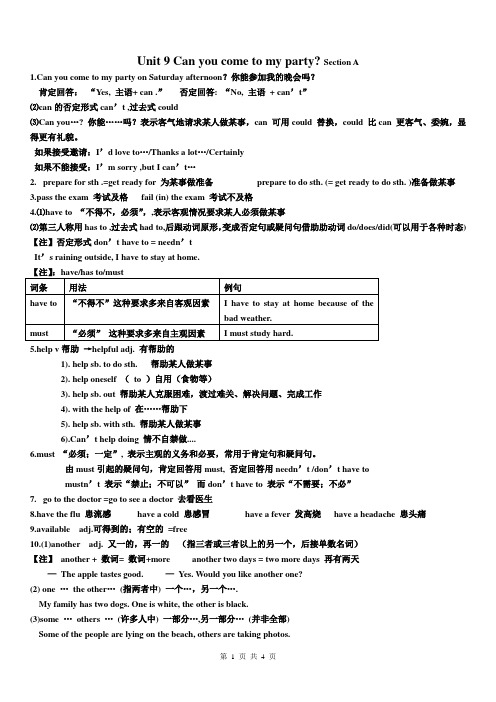
Unit 9 Can you come to my party? Section A1.Can you come to my party on Saturday afternoon?你能参加我的晚会吗?肯定回答:“Yes, 主语+ can .”否定回答: “No, 主语+ can’t”⑵can的否定形式can’t ,过去式could⑶Can you…? 你能……吗?表示客气地请求某人做某事,can 可用could 替换,could 比can 更客气、委婉,显得更有礼貌。
如果接受邀请:I’d love to…/Thanks a lot…/Certainly如果不能接受:I’m sorry ,but I can’t…2.prepare for sth .=get ready for 为某事做准备prepare to do sth. (= get ready to do sth. )准备做某事3.pass the exam 考试及格fail (in) the exam 考试不及格4.⑴have to “不得不,必须”,,表示客观情况要求某人必须做某事⑵第三人称用has to ,过去式had to,后跟动词原形,变成否定句或疑问句借助助动词do/does/did(可以用于各种时态) 【注】否定形式don’t have to = needn’tIt’s raining outside, I have to stay at home.5.help v帮助→helpful adj. 有帮助的1). help sb. to do sth. 帮助某人做某事2). help oneself (to )自用(食物等)3). help sb. out 帮助某人克服困难,渡过难关、解决问题、完成工作4). with the help of 在……帮助下5). help sb. with sth. 帮助某人做某事6).Can’t help doing 情不自禁做....6.must “必须;一定”, 表示主观的义务和必要,常用于肯定句和疑问句。
人教版八年级上册Unit 9 Section A知识点总结

Unit 9 Section A知识点01 on Saturday afternoon 在周六下午课文原句Jenny,can you come to my party on Saturday afternoon?珍妮,你星期六下午能来参加我的派对吗?(P65)辨析:on,in与aton后接的时间多与日期有关,表示星期几、某日、某日的早、午、晚等in后接较长时间,表示“在·····期间/世纪/年/季节/月”at后接的时间最短,表示“在······时刻/时间/在······岁时”知识点02 exam的用法教材原句I have to prepare for an exam.我得准备考试。
(P65)exam做名词,意为“考试”(=examination)Study hard,and you'll pass the exam.努力学习,你就会通过考试的。
固定搭配pass the exam考试及格;fail(in)the exam考试不及格;take an exam参加考试;mid-term exam 期中考试;final exam 期末考试。
知识点03 have a/an/the+表示疾病的名词,表示“得了······病”My fever has gone, but I still have a cough.我退烧了,但还是咳嗽。
have the flu 患流感,冠词用theKate didn't come to school yesterday because she had the flu.凯特昨天没有来上学因为她患流感了。
表达“患······病”的常见短语有:①have a cold 感冒②have a fever 发烧③have a headache 头痛④have a cough 咳嗽⑤have a sore throat 嗓子⑥have a toothache 牙疼知识点04 现在进行时表将来的用法教材原句Oh, but Sam isn't leaving until next Wednesday.对了,萨姆要到下周三才会离开。
八年级上册英语unit9笔记
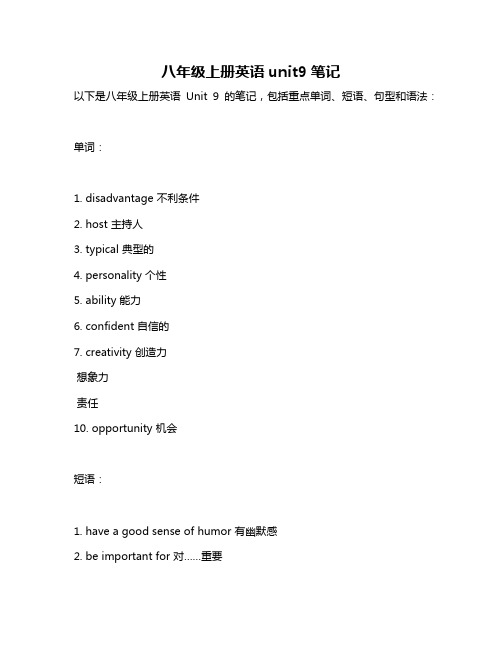
八年级上册英语unit9笔记以下是八年级上册英语Unit 9的笔记,包括重点单词、短语、句型和语法:单词:1. disadvantage 不利条件2. host 主持人3. typical 典型的4. personality 个性5. ability 能力6. confident 自信的7. creativity 创造力想象力责任10. opportunity 机会短语:1. have a good sense of humor 有幽默感2. be important for 对……重要3. be outgoing 外向的4. be friendly 友好5. be hard-working 勤奋的6. be creative 有创造力7. be creative in 在……方面有创造力8. perform well 表现得好9. take charge 负责10. care about 关心句型:1. What are the characteristics of a good friend? 一个好朋友应该具备哪些特点?2. He is always there when I need him. 我需要他的时候他总是在那里。
3. She is the most reliable person I know. 她是我认识的最可靠的人。
4. He has a good sense of humor and always makes me laugh. 他很有幽默感,总是能逗我笑。
5. She is very creative and often comes up with new ideas. 她很有创造力,经常能想出新点子。
6. He is always there to support me and give me encouragement. 他总是在那里支持我,给我鼓励。
7. She is always there to help me and make things easier for me. 她总是在那里帮助我,让事情变得更简单。
人教版八年级上册英语Unit9知识点梳理及语法讲义(教师版)
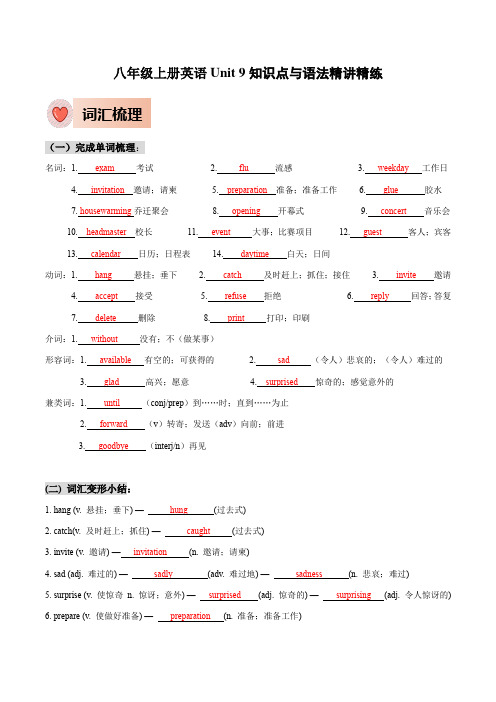
八年级上册英语Unit 9知识点与语法精讲精练词汇梳理(一)完成单词梳理:名词:1. exam考试 2. flu 流感 3. weekday 工作日4. invitation 邀请;请柬5. preparation 准备;准备工作6. glue 胶水7. housewarming乔迁聚会8. opening 开幕式9. concert 音乐会10. headmaster 校长11. event 大事;比赛项目12. guest 客人;宾客13. calendar 日历;日程表14. daytime 白天;日间动词:1. hang 悬挂;垂下 2. catch 及时赶上;抓住;接住 3. invite 邀请4. accept 接受5. refuse 拒绝6. reply 回答;答复7. delete 删除8. print 打印;印刷介词:1. without 没有;不(做某事)形容词:1. available 有空的;可获得的 2. sad (令人)悲哀的;(令人)难过的3. glad 高兴;愿意4. surprised 惊奇的;感觉意外的兼类词:1. until (conj/prep)到……时;直到……为止2. forward (v)转寄;发送(adv)向前;前进3. goodbye (interj/n)再见(二) 词汇变形小结:1. hang (v. 悬挂;垂下) — hung (过去式)2. catch(v. 及时赶上;抓住) — caught (过去式)3. invite (v. 邀请) — invitation (n. 邀请;请柬)4. sad (adj. 难过的) — sadly (adv. 难过地) — sadness (n. 悲哀;难过)5. surprise (v. 使惊奇n. 惊讶;意外) — surprised (adj. 惊奇的) — surprising (adj. 令人惊讶的)6. prepare (v. 使做好准备) — preparation (n. 准备;准备工作)7. open (v. 打开) — opening (n. 开幕式)【练一练】用所给词的适当形式填空1.Thanks a lot for your __invitation___ (invite), but I have to stay at home to do my homework.2.I would like to invite you to the ___opening____ (open) of our new store.3.Susan felt really ___surprised____ (surprise) at the surprising news.4.All the students are busy making ___preparation___(prepare) for the school music concert.5.He ___caught_____(catch) me by the arm and said, “Don't forget.”6.He often goes to school without ____having_____ (have) breakfast.7.They are going to have two ____concerts____ (concert) at this time of year.8.I ___hung______(hang) out late with my friends last night.9.My mother enjoys ___walking_____ (walk) after dinner to keep fit.10.Thanks for ____inviting_____ (invite) me to your party.(三) 短语攻关:prepare for 为……做准备go to the/a doctor 去看医生another time 其他时间;别的时间hang out 闲逛the day before yesterday前天the day after tomorrow 后天look after=take care of照料;照顾turn down 拒绝take a trip 去旅行help out (帮助……)解决look forward to 盼望;期待hear from 接到…(某人的)信in the end 最后have the flu 患流感so that 以便;为了the opening of ……的开幕式invite sb to do sth 邀请某人做某事refuse to do sth 拒绝做某事知识点梳理1.I’d love to e, but I’m afraid I can’t. 我想来,但是恐怕来不了。
Unit9知识点人教版八年级英语上册

八年级上9单元知识点1.情态动词can、could、would表示邀请:can/could/would+主语+动原+其他?Eg:Can you e to my party?“你能来参见我的派对吗?”①接受邀请:Yes,I’d love/like to.①委婉拒绝:Sorry,+原因。
/I’d like/love to,but+原因。
/ I’m sorry+原因。
2.提出邀请、建议、请求或征求别人意见的表达方式。
①let's do sth “我们做某事吧。
”Eg:Let's go shopping.“让我们去购物吧。
”①Shall we do sth?“我们做某事好嘛?”Eg:Shall we hang out?“我们出去逛逛好嘛?”①Would/Could you please (not)do sth?“请你(不要)做某事”Eg:Could you please wait for me?“请你等等我好吗?”①Would you mind(not)doing sth?“你介意(不)做某事吗?”Eg:Would you mind closing the door?“你介意把门关上吗?”①Would you like (not)to do sth“你愿意(不)做某事吗?”Eg:Would you like to hang out?“你愿意出门逛逛吗?”①How/What about doing sth?“做某事怎么样?”Eg:How about hanging out?“出去逛逛怎么样?”①You'd better (not)do sth.“你最好(不)要做某事”Eg: You’d better not read books on the bed.“你最好不要再床上看书。
”①Why don't you do sth?= Why not do sth?“为什么不做某事呢?”Eg:Why not hang out with me?= Why don't you hang out with me?“你为什么不和我一起去逛逛呢?”3.invite(v)邀请invitation(n)邀请①invite sb to+地点“邀请某人到某地”Eg:Binbin invited us to Hainan last month.“彬彬上个月邀请我们去海南。
八上Unit9笔记(人教版)

八上Unit9笔记(人教版)Unit 9 Can you come to my party?Section Ae to + 地点“来到某地”2.On Saturday afternoon 在周六下午On, in, at接时间状语时的区别:(1)On 后常常接具体某一天或某一天的早午晚(2)In后常常接某一段时间或早午晚(3)At后常常接具体的某一时刻Eg: on Sunday 在周日;on May 1st 在五月一日;Monday morning 在周一上午;In a week 在一周里;in May 在五月;in the morning 在上午At 5:00 在五点3.Sure, I’d love to. 当然,我愿意去。
该答语常常用来回答Would you like to do sth. ? “你想要去做某事吗?”的结构。
如果不想做某事,则用Sorry, I’d love to, but ....或Sorry, I can’t.Eg: -- Would you like to go shopping with me ?“你想和我一起去购物吗?”-- Sure, I’d love to.4.Have to 不得不5.Prepare (动词) “准备”-- preparation (名词) “准备”Prepare for ...= get ready for ... 为...做准备Prepare to do sth. 准备做某事Eg: prepare for an exam 为考试做准备I am preparing to visit Beijing. 我准备参观北京。
6.Go to the doctor 去看医生Go to the movies 去电影院7.Have the flue 患流感表示“患病”的常用短语:Have a cold 感冒;have a cough 咳嗽;Have a fever 发骚;have a toothache 牙痛8.Too much + 不可数名词“太多...”Too many + 可数名词复数“太多...”Much too + 形容词“太...”Eg: There is too much water in the pool.池塘里有太多的水。
9.人教版英语八年级上册第九单元知识点总结

Unit9Can you come to my party?(一)短语和句型知识点Section A1a-1ce to来,到来2.on Saturday afternoon在星期六下午3.How\What about you?那你呢?4.I’d love to.=I’d like to.我乐意,我愿意。
5.have to=must+v-原形,必须6.be ready for=prepare for为.....做准备7.go to the doctor=see a doctor看医生8.have the flu=get a flu=have a flu患流感9.prepare for an exam备考1.Can you come to my party?情态动词can的基本用法,其过去式位could,后接动词原形,无人称和数的变化。
(1)表能力,“能,会”1)I can speak(speak)English.2)Can you play(play)the guitar?—Yes,I can.\No,I can’t.(2)表许可(多用于口语),“可以,能”1)I can go go)home tomorrow.2)You can play(play)the computer games after finishing your homework.(3)表推测,can’t“不可能,不会是”;can用于疑问句中,“可能是”1)The man can’t be(be)Li Lei.2)Can this be(be)true?(4)用于表示委婉的请求,其常用句型为:Can you come to...?\Could you come to...?\Would you like to come to...?肯定回答用:1)Sure,I’d love to\I’d like to;2)It sounds great.否定回答用:1)I’d love to\like to,but+理由;2)I’m sorry\Sorry+理由;3)I’m afraid not.(恐怕不行。
- 1、下载文档前请自行甄别文档内容的完整性,平台不提供额外的编辑、内容补充、找答案等附加服务。
- 2、"仅部分预览"的文档,不可在线预览部分如存在完整性等问题,可反馈申请退款(可完整预览的文档不适用该条件!)。
- 3、如文档侵犯您的权益,请联系客服反馈,我们会尽快为您处理(人工客服工作时间:9:00-18:30)。
新人教版八上英语笔记
Unit 9
一.短语
1. So do/did/can/am I.我也是(用于前一句话是肯定句时),Neither do/can/is he.(用于前一句话是否定句时)我也不是。
如,(1) I can swim. So can he. (2)I don’t have apples. Neither does my brother.
(3) You weren’t born in August. Neither was he.
2. in the 70—year history of the competition在七十年的比赛史上,(短连线连起来的词不能变复数和所有格,它本身已经代表了。
)
3.be the first sb./sth. to do sth. , 第一个干…的人/物,
4.at the age of six = when he/she was six. 在六岁时,
5.take part in参加(群众性活动,会议), join加入(团体,组织,党派),be in参加,加入, attend出席,参加(会议,婚礼,典礼), go in for参加(考试)
6.(1) so +形/副原形+that从句,如此…以致于…,He is so young that he can’t go home.
(2)as +形/副原形+ as …与…一样, His bag is as nice as mine.
(3)be +形/副原形+ enough to do sth. 干某事足够…, He is old enough to go go school.
(4)too +形/副原形+ to do sth. 太…而不能干…,He is too young to go to school.
(5)very/quite/really/pretty/so/too/as +形/副原形,
7. a place called…一个叫…的地方, a boy called/named Bill 一个叫比尔的男孩,
8.hum songs 哼唱歌曲, hum—hummed,
9.be famous for sth. 以…著名, become famous变得出名,
10. tour+地点,travel to +地点, “到某地旅行”;
11.learn to do sth.学习干某事,。
